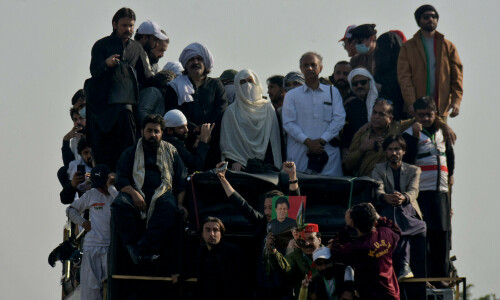MAKKAH, Dec 7: President General Pervez Musharraf on Wednesday urged the Muslim leaders to work out a strategy for Islamic revival and renaissance, and proposed a mandatory contribution by each member state for scientific and technological advancement. He asked extremists to shun violence.
In a wide-ranging address at the 3rd extraordinary summit of the Organization of the Islamic Conference, President Musharraf called for adopting a conciliatory course in the interest of progress and prosperity of Muslim peoples.
He said that a confrontationist course could only lead to further destruction and deprivation and exhorted the need for a conciliatory approach for the wellbeing of the future generations.
“From this holy city of peace and tolerance, I appeal to all extremists in our society to see reason, and shun the path of violence, which offers no salvation and will only lead to more pain and more misery,” he emphasized.
The president said that most Muslim societies were struggling to evolve stable institutions for governance and remained far removed from the frontiers of knowledge, education, science and technology.
“Our economies remain fragile and mostly dependent on raw material production. Even the rich among us are consumers of the fruits of modernization and innovation of other advanced nations who are shaping the direction of progress and future of the world.”
Advocating mandatory contributions, he cautioned that all dreams would remain unfulfilled if not fully backed by collective will and adequate financial resources.
“We must commit to subscribe 0.01 per cent of our GDP which will amount to around $180 million or at least 0.005 per cent of our GDP, which works out to be $90 million,” the president pointed out.
These finances, he said, would have to be banked and managed efficiently and transparently. For this the IDB (Islamic Development Bank) would have to be linked with the OIC secretariat, he suggested.
Referring to the weaknesses of the Muslim world, he said: “Our differences and divisions are exploited. Our failure to secure just resolution of disputes such as Palestine and Kashmir has spawned desperation, confusion and extremism.”
“Senseless acts of terrorism committed by a handful of misguided individuals while claiming to act in the name of Islam, has maligned our noble faith of peace, tolerance and compassion,” he said, adding, “we need to look within; we need to search our soul.”
“We must condemn and reject all forces of terrorism and extremism, banning organizations which preach hate and violence. We must promote the Islamic values of tolerance and moderation.”
The president said that the Putrajaya Summit in 2003 had deliberated on the challenges confronting the Muslim world. “It was a summit of reflection; Makkah must be a summit of decision and action.”
Underscoring the need for a new charter for the OIC, he said the Commission of Eminent Persons (CEP) be mandated this responsibility. “This draft should be placed for adoption at the next summit,” he added.
The CEP has submitted its recommendations which are wholesome, all encompassing and futuristic.
He called for launching a strategy for Islamic revival and renaissance. This, he said, should encompass actions at the national and Ummah level.
He said that the Muslim countries “must promote sound macro-economic policies which can accelerate economic growth, poverty alleviation and job creation, through public and private sector investment.”
Gen Musharraf urged the Ummah to seek knowledge from Quranic injunctions and called for promoting human development through increased investment in modern education and acquisition of scientific and technical knowledge.
He said the OIC secretary-general should be substantially empowered to promote the implementation of the decisions of the summit and the foreign ministers’ conference. He said departments should be created to deal with peace and security, trade and investment within the Ummah, economic and technical assistance, science and technology, inter-faith dialogue and Islamic thought.
He recalled the philosophic accomplishments of Al Ghazali and Ibne Rushd, which gave inspiration to later-day western philosophers; to Ibne Seena for writing Al Qanoon Fil Tib that was used for 600 years as the standard book of medicine in the West; to al Beruni who wrote encyclopaedia on medicinal plants; to Jabar ibn Haiyan who laid foundations of modern chemistry; to Mohammad bin Musa Al Khwarizmi who founded Algebra and modern mathematics and to Al-Zahrawi who invented surgical instruments and Omar al Khayyam, the poet and a scientist.
Even today, he said, the libraries in the West were filled with books written by these scholars, who were products of Madressahs.
“It is unfortunate that most Madressahs of today insist on restricting education to religion alone,” he added.—APP














































Dear visitor, the comments section is undergoing an overhaul and will return soon.